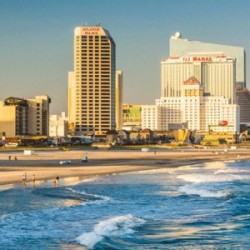New Jersey iPoker Revenues Drop 12% To $1.98m In August

New Jersey‘s August gambling results have now been released by the state’s Division of Gaming Enforcement (NJDGE), and following a familiar theme, overall iGaming results continued to rise and were higher by 15.8% at $12.2 million compared to the $10.5 million generated in August 2014. Likewise, online poker continued its decline, with revenues coming in at $1.98 million, 12% lower than the $2.25 million collected in the same month last year. When added to the revenues generated by its land-based casino industry, New Jersey’s total gaming win amounted to $258.6 million in August, 15.2% lower than August 2014’s tally of $305.0 million.
iPoker 16.2% of iGaming Revenues
In August, NJ’s two operators offering online poker generated $1,983,230 in revenues, which was 12% lower versus the same month last year, but a 5% improvement on July’s figure of $1.885 million. From that tally, the Borgata/PartyPoker partnership produced $1,049,828 in revenues, and Caesars/888/WSOP the remaining $933,402. While August may have marked the fifth consecutive month in which the Garden State’e revenues were below $2 million , the good news is that the 12% decline in year-over-year revenues was considerably lower than the 20% contractions reported over the first quarter of this year. In other words, the state’s iPoker market is now showing signs of having stabilized. So far this year, Borgata has now produced $8,839,827 from iPoker, while Caesar’s is slightly behind with $7,390,769 in revenues. Overall, online poker now represents just 16.2% of the overall iGaming market. However, there are high hopes the ailing market will receive a much-needed boost when PokerStars is eventually granted a New Jersey iGaming licence and allowed to launch its product in partnership with Resorts.
iCasinos 83.8% of Overall Revenues
In August, online casino games generated $10.23 million in revenues, 3.8% lower than the $10.64 million taken the previous month, but 22.9% higher than the $8.3 million collected in August 2014. That figure means online casino games currently account for 83.8% of the overall iGaming market, up from 78.7% for the same month in 2014. From that tally, Tropicana leads the way with $2,789,280 in revenues, followed by Borgata/PartyPoker with $2,626,685, then Golden Nugget ($2,250,713), Caesars/888 ($1,832,465), and finally Resorts ($735,140).
Online Gambling Up 15.8%
Total revenue from online gambling amounted to $12.2 million, up 15.8% versus the $10.5 million reported for August 2014. Leading the industry is Borgata with a 30.1% share of the market, followed by Caesar’s Interactive (22.6%), Tropicana (22.8%), Golden Nugget/BetFair (18.4%), and finally Resorts (6.1%). So far this year, New Jersey’s online operators have produced $96,723,723 in revenues, up 15.8% from the $83,668,485 collected over the same period last year.
Land-based Casinos Down 15.2%
According to the New Jersey Division of Gaming Enforcement, the state’s 8 land-based casinos and their iGaming operations produced a total of $258.6 million in August, 15.2% down on the $305 million taken in August 2014. When the four casinos which shut over the past year are excluded from the results, however, revenues were actually just 5% down on the 272.3 million reported for August 2015.
Last month, just three of Atlantic City’s casinos saw their revenues grow year-over-year, lead by the Golden Nugget up 27.8% to $22.4 million; followed by Resorts up 18% to $17.6 million; and Borgata up 7.8% to $74.8 million.
On the other side of the coin, Caesars was down 28.6% to $31.4 million; followed by Trump Taj Mahal down 24% to $18.9 million; Bally’s Atlantic City down 9.2% to $23.4 million; Harrah’s down 8.7% to $35.5 million; and Tropicana down 7.3% to $31.1 million, year-on-year.
Casinos Up Over First 8 Months
So far this year, Atlantic City’s eight remaining casinos have generated $1.73 billion in revenues, a 3.2% improvement on the same period through to August 2014. Commenting on the results, NJDGE chairman Matt Levinson, said:
“Atlantic City’s gaming industry has changed dramatically since this time last year, going from 11 casinos down to eight. But Atlantic City’s operating casinos had a 2.4 percent increase in gaming revenue this summer compared to last. August was down, but the existing operators still are up approximately 3.2 percent for the first eight months of this year.”
Going forward, New Jersey’s casino industry faces the same challenge as those of other states across the country. Namely, how to attract more younger people to venues which are currently dominated by the elderly population. As Daniel Sahlfrom the Center for Gaming Innovation at the University of Nevada at Las Vegas, explains:
“Millennials, especially, think of leisure activities as “a social experience that you share with friends. Gambling does not resonate with them as particularly fun to do.”







